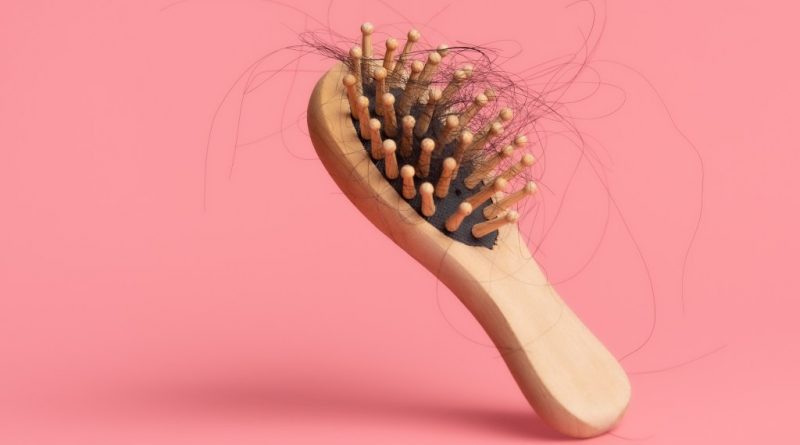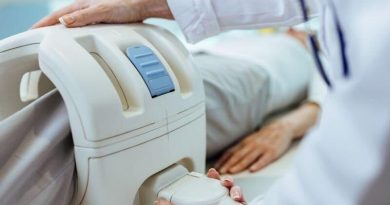You Can’t Prevent Post-Pregnancy Hair Loss, but Here’s What You Can Do
If you purchase an independently reviewed product or service through a link on our website, SheKnows may receive an affiliate commission.
Feeling like you’re shedding is a very uncomfortable feeling, and ideally, we all would love to maintain a thick, lustrous mane throughout pregnancy and postpartum. But unfortunately, as experts tell SheKnows, it’s impossible to prevent pregnancy hair loss — which happens to roughly 50 percent of people who give birth. The two-fold cause for hair loss is common knowledge in the medical field. First of all, people’s hair generally thickens during pregnancy due to hormones and growth factors.
According to dermatologist Dr. Lindsey Bordone, who specializes in hair loss at ColumbiaDoctors and is the Assistant Professor of Dermatology at Columbia University Medical Center, there is no way to control or prevent your body from going back to its pre-pregnancy state and maintaining that increase in hair volume.
The other factor in post-pregnancy hair loss, though, has to do with telogen effluvium — a reversible condition in which hair falls out after a stressful experience.
“Changes like delivery, breastfeeding, sleep deprivation, and hormones place stress on the body, and in response the body works to conserve energy and resources from areas of low priority, such as hair growth, in favor of supporting other more critical changes taking place,” Bordone tells SheKnows. “When this happens, many hairs are shifted to the shed phase of the hair cycle and then in a one-to-three month period shedding begins.”
Typically, the shedding only lasts two to three months, and for most people, hair will gradually grow back their pre-pregnancy baseline hair density. Still, there are ways to regrow your hair after giving birth that experts and new parents (who aren’t brand spokespeople) swear by.
Our mission at SheKnows is to empower and inspire women, and we only feature products we think you’ll love as much as we do. Nutrafol is a SheKnows sponsor, however, all products in this article were independently selected by our editors. Please note that if you purchase something by clicking on a link within this story, we may receive a small commission of the sale.
Consider your nutrition
Trichologist and hair biochemist Dr. Dominic Burg acknowledges that there’s no definite tried-and-true approach to preventing hair loss, but there are some ways to lessen its effects and look after your locks, like prioritizing a nutritious diet. “Added demands on the body’s energy and changed nutritional requirements after birth also disrupt the natural hair cycle. To minimize any impact, make sure you eat a good balanced diet (as much as is possible), with plenty of protein, leafy greens, fruits and vegetables,” Burg says. “This is not always easy after the arrival of a new baby; so many women get nutritional support by taking one of the many postnatal supplements. Always ask your physician advice before starting any oral supplementation, particularly if you’re breastfeeding.”
One of our go-to supplements that can offer you extra support with postpartum hair loss is Nutrafol’s Postpartum Hair Loss Neutraceutical. The supplement is packed with all the vitamins you need on a regular basis for balanced nutrition, including vitamins A, C, D, and eight different B vitamins, one of which is the hair growth-boosting biotin, or B7. Omega-3s in the formula provide healthy fats that nourish the hair follicles and marine collagen, a protein that supports hair growth.

Be gentle with your strands
“Resting follicles are fragile and can be dislodged easily,” Berg adds. “Be kind to your follicles when brushing, washing and drying.”
And don’t use too much pressure to keep these fragile hairs on your scalp for a bit longer.
Zlata Feuerman, a mother who documented her pregnancy hair loss, said that Pai-Shau—a tea-infused hair care product—is the only hair product she used for a huge difference in her hair growth.
“If you do experience excess shedding, you can add back volume with specialized products,” Burg says. “Look for gentle, lightweight cleansers and conditioners (preferably clean and natural) specifically designed to volumize with added ingredients such as keratin for fortification and baobab to provide hydration.”
Zlata Feuerman, a mother who documented her pregnancy hair loss, said that Pai-Shau—a tea-infused hair care product—is the only hair product she used for a huge difference in her hair growth.

Amazon.
And remember, dry shampoo can still be your best friend! Find a good quality one that can boost volume and texture. (Just “use sparingly and in a well-ventilated area,” according to Burg.)
Minimize stress (or at least try to!)
According to Berg, stress makes your body produce stress hormones such as cortisol, which impact your hair “alongside the changes in estrogen and progesterone, potentially exacerbating the effects.”
One way to manage stress is having a regular check-in with yourself via an app like Expectful. It includes education and community so that you can understand what other parents are going through during pregnancy and the postpartum period, but also includes guided meditations that can walk you through things like calming down to breastfeed and embracing your postpartum body.

Before you go, check out some of our favorite products that might actually help you sleep:
Source: Read Full Article




